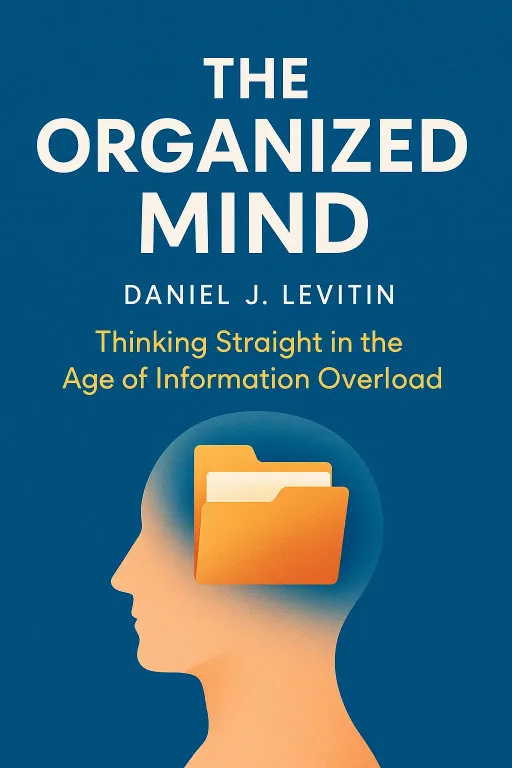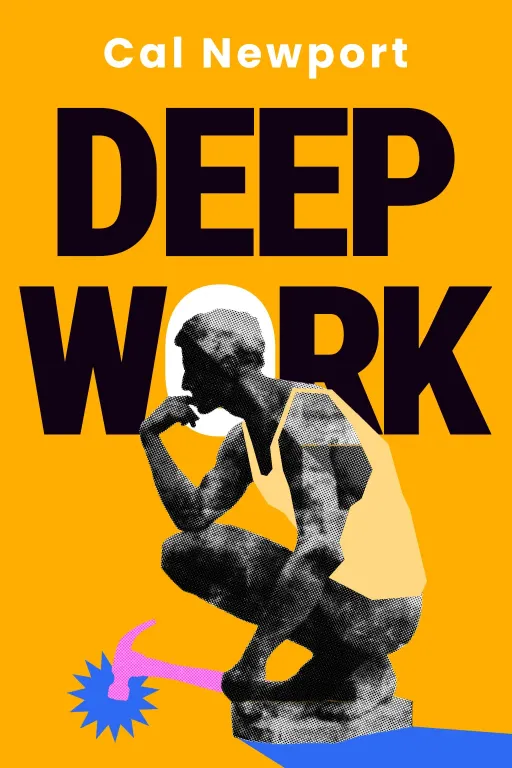
The Organized Mind
9 minThinking Straight in the Age of Information Overload
Introduction
Narrator: A young, brilliant student from communist Romania named Ioana arrives in North America for university. Having grown up with scarcity and limited options, she is intelligent and curious but utterly unprepared for the paradox of choice. One day, her professor finds her in the college bookstore, distraught and on the verge of tears. The source of her anxiety? An entire aisle dedicated to pens. She had spent hours paralyzed, unable to decide which pen was best for which class, overwhelmed by the sheer volume of trivial decisions. To her, this abundance wasn't freedom; it was, in her words, "terrible." This feeling of being mentally exhausted by a constant stream of information and choices is the central crisis neuroscientist Daniel J. Levitin unpacks in his book, The Organized Mind. He argues that our brains, which evolved for a far simpler world, are not equipped for the relentless demands of the information age, leading to cognitive overload that sabotages our focus, productivity, and peace of mind.
The High Cost of Attentional Switching
Key Insight 1
Narrator: Many people pride themselves on their ability to multitask, juggling emails, text messages, and multiple work projects simultaneously. However, Levitin reveals that multitasking is a powerful and detrimental illusion. Our brains are not designed to focus on multiple tasks at once. Instead, what we call multitasking is actually rapid attentional switching. As MIT neuroscientist Earl Miller explains, every time we switch from one task to another, our brain incurs a cognitive cost. This switching burns through the glucose our brain needs for fuel, leading to mental fatigue and reduced efficiency.
Research conducted by Glenn Wilson at Gresham College, London, found that simply being in a situation where an unread email sits in an inbox can reduce a person's effective IQ by 10 points. This constant state of distraction creates a dopamine-addiction feedback loop; the brain gets a small, rewarding hit of novelty from checking a new message, which encourages it to lose focus again and again. This cycle not only makes it harder to engage in the deep, sustained thought required for complex problem-solving and creativity, but it also elevates levels of the stress hormone cortisol. The myth of multitasking isn't just a harmless misconception; it's a metabolically expensive habit that leaves us tired, stressed, and less effective.
The Brain's Haphazard Architecture
Key Insight 2
Narrator: To understand why we struggle so much with organization, Levitin argues we must first understand the brain itself. He uses a powerful analogy: the brain is not like a sleek, newly constructed building, but rather a big, old house that has undergone countless piecemeal renovations over millennia. Different systems were added at different times without a master plan. For example, the system for finding food evolved separately from the system for avoiding predators, and both evolved long before the systems needed for reading or doing calculus.
This evolutionary patchwork means our brain's filing system is inherently messy. Cognitive psychologists have shown that human memory is deeply unreliable, not because of a lack of storage, but because of a flawed retrieval system. Memories are not replayed like video recordings; they are reconstructed each time we access them, making them vulnerable to distortion. This is why a single, vivid story, like a friend's bad experience with a Volvo, can often outweigh mountains of statistical data from Consumer Reports showing the car is reliable. Our brains are wired to prioritize compelling narratives over dry facts, a feature that was useful for ancestral survival but is a liability in the modern world. This haphazard architecture is why we can’t simply will ourselves to be more organized; we must work with the brain’s limitations.
The Power of Externalizing Your Mind
Key Insight 3
Narrator: Given the brain's flawed memory and limited attentional capacity, the single most critical principle for an organized mind is to shift the burden of organization from our brains to the external world. This means creating physical systems that do the remembering for us. A powerful example of this principle in action comes from the career of Edmund W. Littlefield, a highly successful CEO who served on the boards of major companies like General Electric and Wells Fargo.
Littlefield taught his assistant a simple but profound system for managing his mail. All incoming correspondence was immediately sorted into four physical piles: items to be dealt with right away; important items that could wait; unimportant items to be kept; and items to be thrown out. By physically categorizing his tasks, he offloaded the mental work of remembering and prioritizing. His brain was freed from the nagging anxiety of forgetting something important, allowing him to focus completely on the task at hand. This principle of active sorting—whether through physical trays, index cards, or digital folders—is the foundation of an organized life. It moves information out of our cluttered internal "closet" and into a structured, visible system, reducing cognitive load and preventing mistakes.
The Wisdom of Satisficing
Key Insight 4
Narrator: The modern world doesn't just overwhelm us with information; it overwhelms us with decisions. From choosing a breakfast cereal out of hundreds of options to picking a health insurance plan, our brains are not equipped to make an endless series of optimal choices. The decision-making network in the brain doesn't prioritize, meaning a trivial choice can burn as much neural energy as a life-altering one. The solution to this decision fatigue is a concept called "satisficing."
Coined by Nobel laureate Herbert Simon, satisficing means choosing an option that is "good enough" rather than wasting time and energy searching for the absolute best. Warren Buffett, one of the world's most successful investors, is a master of this. He lives in the same modest home he bought decades ago and once spent a week in New York City eating Oreo cookies and milk for breakfast. He satisfices on these everyday decisions to conserve his finite mental energy for what truly matters: his investment strategies. By consciously deciding which areas of life don't require perfection, we can avoid decision fatigue and allocate our precious cognitive resources to the high-priority endeavors that truly make a difference.
Creating Order in the Physical World
Key Insight 5
Narrator: The principles of externalization and categorization extend directly to our physical environments. Cluttered homes and workspaces are not just an aesthetic issue; they are a cognitive one. Studies show that clutter can spike levels of the stress hormone cortisol, leading to chronic cognitive impairment and fatigue. The solution is to create designated places for our belongings, leveraging the brain’s powerful spatial memory system, which is managed by the hippocampus.
London taxi drivers, who must memorize the city's labyrinthine streets, have been shown to have larger hippocampi than the average person. This demonstrates the brain's remarkable capacity for place memory. We can harness this by creating a "home" for frequently lost items like keys, wallets, and phones. By consistently placing these items in the same spot, we offload the task of remembering their location from our conscious mind to our brain's more reliable autopilot. Furthermore, we can use "affordances"—design cues that suggest an object's use, like a flat plate on a door indicating "push"—to make our environment more intuitive. An organized physical space is not about sterile perfection; it's about creating a cognitively efficient environment that reduces stress and frees up mental resources for more important things.
Conclusion
Narrator: The single most important takeaway from The Organized Mind is that the solution to information overload is not to try harder or to somehow upgrade our brains. The solution is to accept our cognitive limitations and build intelligent external systems to compensate for them. Our brains are not broken; they are simply operating in an environment for which they were not designed. By externalizing memory, satisficing on decisions, and creating organized physical and digital spaces, we can offload the immense burden that the modern world places on our minds.
The challenge, then, is to stop blaming yourself for forgetting an appointment or losing your keys and start asking a different question: What system can I build so my brain doesn't have to remember this? True mental organization isn't about having a better memory; it's about creating a better world around you.









